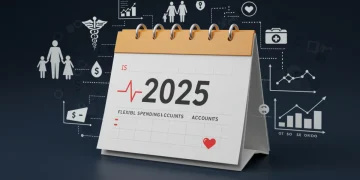Healthcare rebate for low earners: how to maximize benefits

Healthcare rebates for low earners provide financial assistance to reduce medical costs, enabling eligible individuals to claim refunds on specific healthcare expenses by following the application procedures accurately.
Healthcare rebate for low earners often goes unnoticed, yet it can ease financial burdens significantly. Have you checked if you qualify? Let’s dive into how you can benefit.
Understanding healthcare rebates
Understanding healthcare rebates can be quite beneficial for those looking to save money on medical expenses. These rebates are designed to help individuals who may struggle with healthcare costs, especially low earners. Knowing how these rebates work can lead to substantial savings.
What Are Healthcare Rebates?
Healthcare rebates essentially provide a refund for certain medical costs. They are often offered by the government or healthcare insurers to support individuals and families who meet specific income criteria. For low earners, these rebates can significantly reduce the burden of medical expenses.
Types of Healthcare Rebates
- Premium assistance programs.
- Discounts on prescription medications.
- Reimbursement for out-of-pocket costs.
Each type of rebate has its procedures and eligibility requirements. Therefore, it’s essential to research the specific rebates available in your state or region. For many, taking the time to understand these options can open the door to savings you didn’t even know existed.
Once you identify the appropriate rebates, the application process is often straightforward. Typically, you will need to provide documentation of your income and any medical expenses incurred. It helps to keep all medical receipts organized, as this can simplify the filing process significantly.
Eligibility for Rebates
Eligibility criteria for these rebates can vary. Generally, low earners must prove that their income falls below a certain threshold. If you qualify, you may access various programs designed to assist with healthcare costs.
Have you checked if you meet these criteria? Many people miss out simply due to lack of awareness. The process is worth it as it can lead to reduced healthcare costs, promoting better access to necessary medical services.
Eligibility criteria for low earners
Eligibility criteria for low earners can vary depending on the specific healthcare rebate programs available. Understanding these criteria is crucial for accessing financial assistance. Many individuals might qualify for rebates, but they often aren’t aware of the requirements.
Common Eligibility Requirements
Applicants usually need to demonstrate that their household income is below a certain threshold. This is often calculated based on guidelines set by government programs or healthcare providers. Additionally, specific categories may apply, such as:
- Income limits based on family size.
- Residency requirements in certain states.
- Verification of current employment or financial status.
Meeting these criteria can open doors to valuable resources, allowing you to save on healthcare costs. It’s important for applicants to gather necessary documents, including pay stubs and tax returns, to support their applications. This documentation helps establish eligibility and ensures a smoother application process.
Residing in Target Areas
Many programs may also stipulate that applicants reside in designated areas, particularly in underserved regions. Low-income individuals living in these target zones may qualify for additional support. Furthermore, local health departments can provide information about healthcare rebates tailored to specific communities.
If you’re unsure about your eligibility, consider reaching out to local health offices. They often hold workshops and provide assistance specifically for low-income individuals navigating healthcare options.
How to apply for healthcare rebates

Applying for healthcare rebates may seem daunting, but understanding the process can make it much easier. The first step is to gather all the necessary documents. This typically includes proof of income, medical expenses, and identification documents. Being organized from the start can save you time in the long run.
Steps to Apply
- Find the appropriate rebate program for your needs.
- Complete the application form thoroughly.
- Submit required documentation to verify your eligibility.
After gathering your documents, you can usually apply online or by mail, depending on the program. Online applications often allow for quicker processing times, which can be advantageous. Don’t forget to double-check all your entries before submitting.
What to Include with Your Application
When submitting your application, you must include:
- Tax returns to show your income.
- Receipts for medical expenses.
- Any additional forms required by the program.
By ensuring all required documentation is included, you increase the likelihood of your application being processed without delays. If you encounter difficulties or have questions, consider reaching out to local health agencies or community organizations for assistance. They often provide support for navigating the application process.
Follow-Up on Your Application
After you’ve submitted your application, be sure to follow up. Check the status of your application as many programs provide tracking options. This way, if there’s any issue, you can resolve it quickly, ensuring you receive the benefits.
Common mistakes to avoid
When applying for healthcare rebates, it’s important to be aware of common mistakes that could delay or deny your application. Understanding these pitfalls can help you navigate the process more smoothly and increase your chances of receiving benefits.
Incomplete Applications
One of the most frequent errors people make is submitting incomplete applications. Always tick off every required document and section of the application. Missing information can lead to delays or outright rejection. Be thorough in providing all necessary details.
Ignoring Deadlines
Another critical mistake is not paying attention to deadlines. Each rebate program has specific time frames for applications. Missing a deadline could mean waiting another year for assistance. Mark important dates on your calendar, and submit early to avoid last-minute issues.
Applicant Eligibility
- Not checking if you meet income requirements.
- Failing to verify residency in designated areas.
- Overlooking previous rebate applications that could affect eligibility.
It’s essential to review your eligibility against the criteria of the specific rebate program. Being proactive can save you from unnecessary hassles later on.
Insufficient Documentation
Submitting insufficient or incorrect documentation is another common oversight. Make sure you include all necessary proof of income and medical expenses. It’s a good idea to create a checklist of required documents to ensure everything is in order.
Neglecting to Follow Up
After submitting your application, some individuals forget to follow up. Always take the time to check the status of your application. This helps to identify any issues as quickly as possible, allowing you to address them promptly.
Maximizing your rebate benefits
Maximizing your rebate benefits can make a significant difference in your overall healthcare expenses. Knowing how to fully utilize the rebates available to you is key to enhancing your financial support.
Understanding Your Eligibility
First, ensure you understand the eligibility criteria for the rebates. Being fully aware of what you qualify for allows you to leverage all available options. Check income limits and residency requirements, as these can change and vary by program.
Keep Track of Medical Expenses
Carefully documenting and tracking your medical expenses is essential. You can maximize your rebate by knowing exactly what you spend on healthcare. Consider keeping all your receipts and bills organized to have a clear picture of your expenses.
Apply for Multiple Rebates
Many people are unaware that they can apply for more than one rebate program. Explore different programs available in your area. Some may offer rebates for specific medical expenses, while others might cover broader healthcare costs. By applying for multiple rebates, you enhance your chances of saving more.
Consult with Professionals
If you are unsure about the best way to maximize your savings, consider consulting with a financial advisor or healthcare navigator. These professionals can provide personalized advice and help you make informed decisions about your healthcare spending.
Regularly Review Your Applications
Once you’ve applied, periodically review your applications and any changes in rebates. Staying up-to-date with new programs or changes in existing ones can make a big difference. Additionally, follow up on any pending applications to ensure that they are processed in a timely manner.
In conclusion, understanding how to maximize your healthcare rebates can lead to significant financial benefits. By staying organized, tracking your medical expenses, and being aware of your eligibility, you can navigate the rebate process more effectively. Applying for multiple programs and consulting with professionals can further enhance your savings. Always remember to follow up on your applications to ensure you receive the benefits you deserve. With careful planning and proactive measures, you can enjoy better healthcare while minimizing costs.
FAQ – Frequently Asked Questions about Healthcare Rebates for Low Earners
What are healthcare rebates?
Healthcare rebates are financial refunds or assistance provided to individuals for medical expenses, aimed at helping those with low income reduce their healthcare costs.
How can I apply for healthcare rebates?
To apply for healthcare rebates, gather necessary documents, complete the application form accurately, and submit it by the deadline. You may apply online or by mail, depending on the program.
What common mistakes should I avoid when applying?
Avoid submitting incomplete applications, missing deadlines, neglecting to follow up on your application, and failing to include necessary documentation.
How can I maximize my rebate benefits?
You can maximize your rebate benefits by keeping track of all medical expenses, applying for multiple programs, and regularly reviewing your applications for updates or changes.





